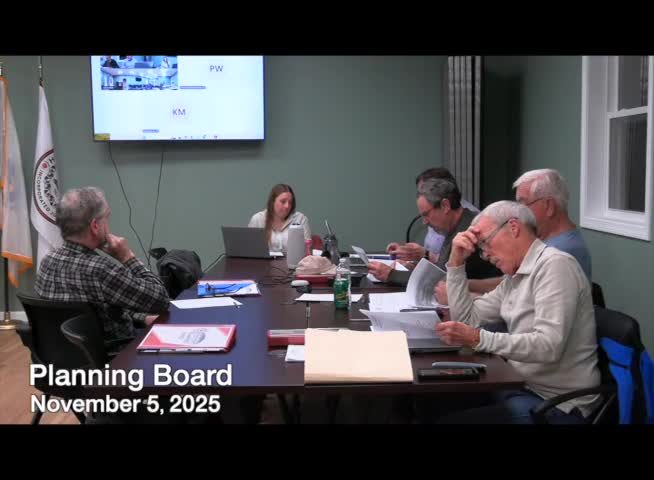Hubbardston planning board backs MRPC scope change; members press for limits on extraction, aquifer protections and clustered open-space housing
Get AI-powered insights, summaries, and transcripts
Subscribe
Summary
The Town of Hubbardston Planning Board on Nov. 5 authorized the chair to sign a revised MRPC scope of work narrowing the project to GIS parcel analysis and light recommendations, and spent the meeting providing detailed stakeholder feedback on allowable uses, lot sizes, aquifer protections, open‑space clustering and limits on on‑site extraction.
The Town of Hubbardston Planning Board on Nov. 5 authorized the chair to sign a revised scope of work with the Montachusett Regional Planning Commission (MRPC) and consultant that narrows the outreach and technical task toward a GIS evaluation of existing parcels and lighter policy recommendations. The authorization was carried after discussion and a motion; the board emphasized that the consultant’s work should reflect the town’s sensitivity to aquifer protection, open‑space preservation and limits on temporary sand‑and‑gravel extraction tied to site development rather than standalone quarrying.
Alec (planner/consultant) and members ran through seven questions from the engineering team (referred to in materials as the Niche/NINJA team) about which commercial and residential uses should be by‑right versus special permit, minimum lot sizes, upland requirements, buffers between different uses, and rules for extraction during site preparation. Board feedback coalesced around a middle scenario: limit heavy, high‑traffic retail and industrial/warehouse uses; allow mixed‑use and village‑scale commercial where appropriate; and permit housing (including higher‑density options such as duplexes, townhouses or clustered open‑space developments) in parts of the site that are not within critical aquifer‑protection areas.
Several members urged the board and consultants to prioritize planned‑unit or open‑space residential development models that concentrate housing on smaller footprints while preserving large tracts as permanent open space. Members said cluster development could enable more affordable units and shared amenities and could reduce roadway and maintenance costs compared with dispersed single‑family lots. At the same time, multiple speakers stressed that wastewater limitations (Title 5 and nitrate‑loading constraints) and local aquifer‑protection rules will be the practical constraints that determine achievable density; the board asked for engineering scenarios that reflect wastewater and upland buildability.
The board debated extraction of sand and gravel during phased site work. Members repeatedly warned against allowing extraction as an unfettered, front‑end commercial quarrying operation. The board’s favored approach: allow on‑site earth removal only when it is directly tied to an approved subdivision or site plan, accompanied by guardrails such as limits on duration, reclamation obligations, bonds or contractual protections, and explicit findings that extraction is necessary for the approved development and not a separate permanent pit operation.
On buffers and use separation, the board differentiated between mixed‑use village scenarios (where minimal separation is acceptable) and industrial/warehouse uses (which warrant significant setbacks and buffers). Members also discussed including trail networks, small community recreational spaces and optional design guidance for village areas, while acknowledging local resistance to prescriptive architectural standards.
The board asked MRPC and the engineering consultant to return with GIS‑based parcel analysis, engineering feasibility studies for wastewater/Title 5 options, and draft recommended zoning language that preserves open space and specifies guardrails for extraction. The motion to authorize the chair to sign the MRPC amendment passed; the board indicated it will track the consultant’s recommendations and expect further materials for potential bylaw drafting and future public hearings.
The meeting also included a separate administrative discussion of recently issued state rulemaking that would establish an extra‑jurisdictional review role (described in materials and public comments as a 'circuit' reviewer); board members asked that MRPC’s submitted comments be placed on record and agreed to return the topic to a future agenda so the town can coordinate a local response.
